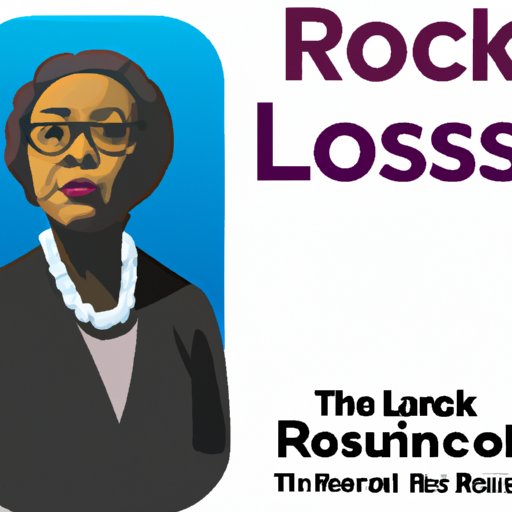Introduction
Rosa Parks is one of the most well-known figures in American history. Her courageous act of refusing to give up her seat on a Montgomery, Alabama bus in 1955 sparked a revolution that changed the course of America’s civil rights movement. But what exactly made Parks’ actions so powerful? How did she become a leader in the movement? This article will explore these questions by analyzing Parks’ courageous leadership, examining her impact on the civil rights movement, exploring her legacy of leadership, and investigating the lasting impact of Parks’ leadership.
Analyzing Rosa Parks’ Courageous Leadership
On December 1, 1955, Rosa Parks was arrested for refusing to give up her seat on a Montgomery, Alabama bus to a white man. As Parks later recalled, “I felt I had no alternative but to protest in the only way I knew.” By breaking the law, Parks sparked a massive boycott of the city’s buses, which lasted 381 days and was led by Martin Luther King Jr. Her actions not only challenged the racial segregation laws of the time, but also brought national attention to the plight of African Americans in the South.
Parks’ actions demonstrate her courage and her willingness to stand up for what she believed in. She could have chosen to simply give up her seat without making a fuss. Instead, she chose to take a stand and challenge the status quo. Her courage and conviction are what made her a leader in the civil rights movement, inspiring others to join the fight for equality.
Examining Rosa Parks’ Impact On The Civil Rights Movement
The impact of Parks’ actions cannot be overstated. Her refusal to give up her seat on the bus helped to galvanize the civil rights movement and bring national attention to the issue of racial inequality. According to David J. Garrow, author of Bearing the Cross: Martin Luther King and the Southern Christian Leadership Conference, “It was Rosa Parks’ arrest that triggered the Montgomery Bus Boycott.”
The boycott eventually led to a Supreme Court ruling that declared segregated seating on public buses unconstitutional. In addition, the boycott provided a platform for Martin Luther King Jr., who became a prominent figure in the civil rights movement as a result. Parks’ actions thus served as a catalyst for change and helped to set in motion a series of events that would ultimately lead to the dismantling of Jim Crow laws and the passage of the Civil Rights Act of 1964.
Exploring The Legacy Of Rosa Parks’ Leadership
Rosa Parks’ legacy as a leader in the civil rights movement has endured long after her death. Her refusal to give up her seat on the bus has become an iconic symbol of defiance and courage, inspiring generations of activists to continue the fight for racial justice. As the NAACP noted in a statement following her death in 2005, “Rosa Parks’ singular act of disobedience launched a movement that ended legal segregation in America and made our nation more open and accessible to all.”
Her legacy is also evident in the many monuments, memorials, and museums dedicated to her memory. In addition, her name has been used to honor countless schools, parks, and other public spaces throughout the country. All of these serve to remind us of the power of one person’s courage and conviction to effect lasting change.
Investigating The Lasting Impact Of Rosa Parks’ Leadership
In addition to her legacy, Rosa Parks’ leadership has had a lasting impact on the civil rights movement. Her refusal to give up her seat on the bus was part of a larger strategy to challenge the system of segregation and discrimination in the South. As historian Jeanne Theoharis notes, “Parks was not simply tired; she was engaged in a political strategy of civil disobedience.”
Her strategic approach to challenging the status quo has been adopted by countless civil rights activists since then. From the Freedom Riders of the 1960s to the Black Lives Matter movement today, Parks’ legacy continues to be an inspiration for those fighting for racial justice. Her example of courage and determination serves as a reminder that even one person can make a difference.
Conclusion
Rosa Parks’ brave decision to refuse to give up her seat on a Montgomery, Alabama bus in 1955 sparked a revolution that changed the course of America’s civil rights movement. Her courageous leadership inspired others to join the fight for equality and paved the way for the passage of the Civil Rights Act of 1964. Her legacy of leadership continues to inspire activists today, reminding us that even one person can make a difference.
Parks’ refusal to give up her seat on the bus serves as a reminder of the power of courage and conviction. Her example shows us that it is possible to challenge the status quo and effect lasting change. As we continue to fight for racial justice today, let us remember the legacy of Rosa Parks and strive to emulate her courage and determination.
(Note: Is this article not meeting your expectations? Do you have knowledge or insights to share? Unlock new opportunities and expand your reach by joining our authors team. Click Registration to join us and share your expertise with our readers.)
